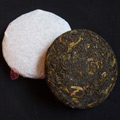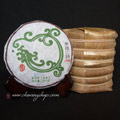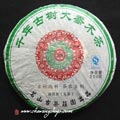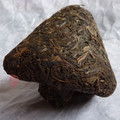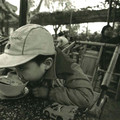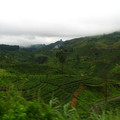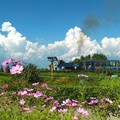Pu-erh - 5 stars - 3 and more stars
Tea by type
Tea by region
Tea by years and other
2011 Mengmao Lao Shu Ye Sheng Xiao Bing 100g
 1 review
1 review2011 Spring harvest. This material come from Baoshan area, 2600 meters high mountain closed with Mengmao village. There is home for wild arbor big tea trees in ecological environment. This tea is 100% organic - more than 90% vegetation cover, it's a beautiful place free from pollution. Residence is known for undiscovered "paradise", "tea tree ancestor". This kind of wild tea has special purple color leaves. This tea is called three color tea. Fresh leaves are purple, dried tea is...
2012 Chawangpu Jingmai Gu Shu Xiao Bing Cha 200g
 1 review
1 reviewThis tea is from Jingmai Da Zhai, grown on the Da Ping Zhang area, and is considered some of the finest Jingmai tea available. Another famous tea village is Mangjing. The Mangjing tea taste more simple and bitter, therefore be sold at a lower price. Jingmai mountain is famous for middle/little leaf tea (中小叶种茶) which is popular for its sweet taste and floral aroma. Jingmai Da Zhai is one of the most famous village and has the biggest ancient tea tree garden in Jingmai mountain,...
2012 Myanmar - Beyond The Small Mengsong Mountain Gushu Xiao Bing 200g
 1 review
1 reviewThe raw materials of this cake came from villages in Myanmar, its north border on small Mengsong mountain. Tea trees are about three hundreds years old and remain unmanaged. The natives living in isolated areas where transportation is difficult, they carry the tea on the backs and walk to the border. The tea is not expensive but does not come by easily.
Theme
Quotes
„Pu-erh shape - Brick - A thick rectangular block of tea, usually in 100g, 250g, 500g and 1000g sizes; Zhuancha bricks are the traditional shape used for ease of transport along the ancient tea route by horse caravans.“
Latest posts
01.01.2016 @ 18:14:35 - Eternal Spring:
WeRateTea.com wish you all the best for 2016!...
07.12.2015 @ 09:07:02 - sypalino:
I decided to taste this tea 2 weeks after delivery. The cake is lightly pressed, so...
09.11.2015 @ 21:58:19 - Eternal Spring:
Comparison of 2013 Bada Pu-erh.sk with <a...
09.11.2015 @ 09:34:07 - Eternal Spring:
Lao Yu 2013 is now about 2,5 years old tea and out of this 1,5 year stored in Europe....
09.11.2015 @ 09:33:11 - Eternal Spring:
Comparison of all three Lao Yu is now done :)
15.10.2015 @ 11:06:37 - Eternal Spring:
2015 Chawangpu Collection – I can only tell, that all teas are very good :)
09.10.2015 @ 10:31:19 - Eternal Spring:
It was quite long and difficult tasting to make a decision… There is still quite...
24.01.2015 @ 16:55:57 - Eternal Spring:
WeRateTea.com wish you all the best for 2015!...
30.12.2014 @ 17:19:22 - Eternal Spring:
"FT(For Taiwan)" means this brick was a special order of "Fei Tai" Company. Fei Tai...
13.08.2014 @ 18:24:28 - Eternal Spring:
We compared two teas from Youle. 2005 Jinuo Shan You Le "Red Sun Drum" and 2009...
Tea by region
We will help you with tea selection.
Do you like quality loose tea?
We will help you to find the right one for you. Be inspired by tea ratings of other tea lovers. Rating stars could help you.


Review your cup of tea.
Review the tea you are drinking and help other tea lovers to find the right cup of tea.






 Shops
Shops
